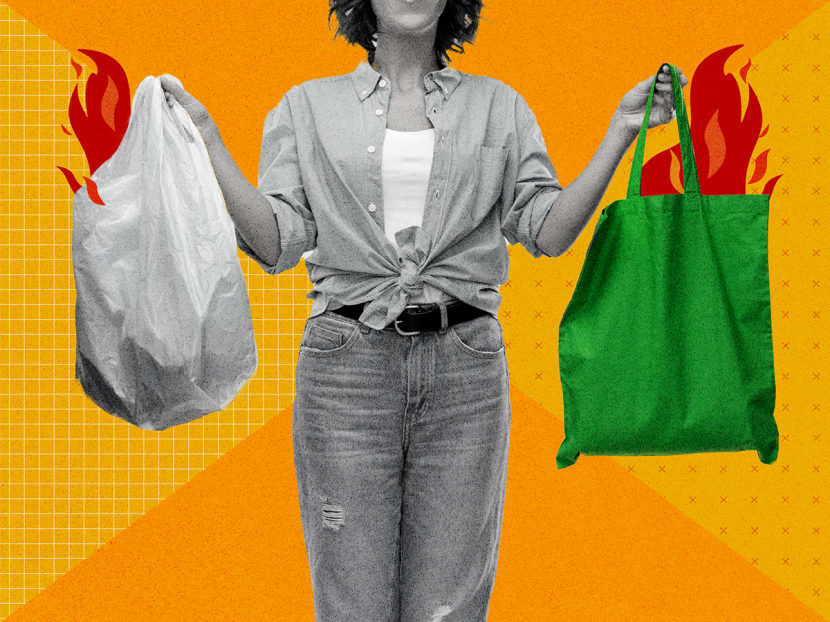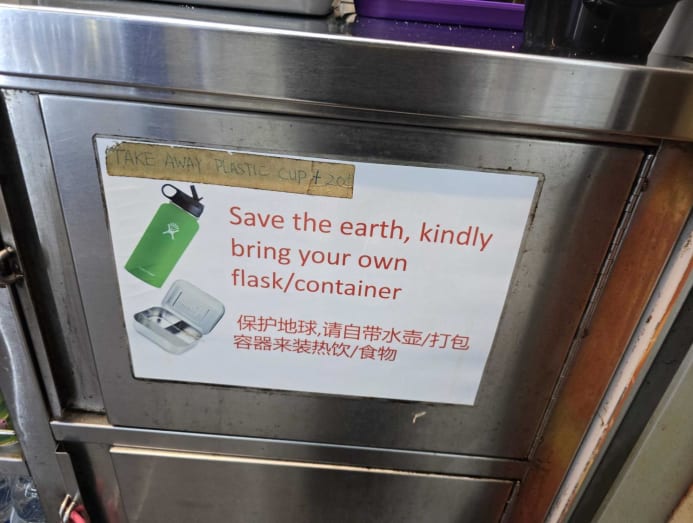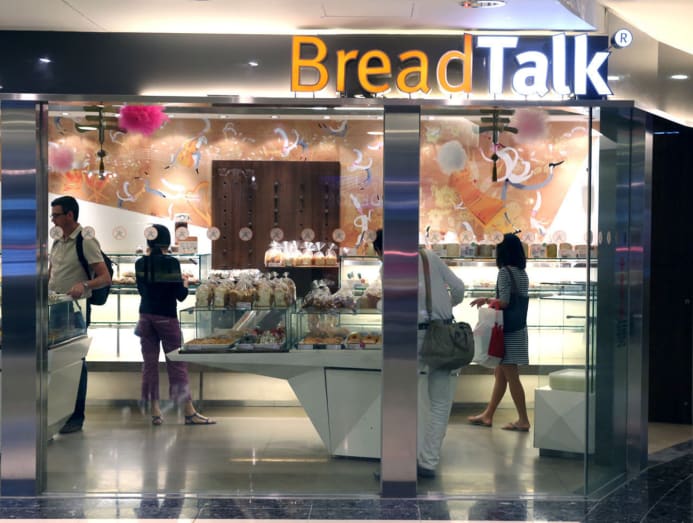Hot Take: Whether BreadTalk and Skechers are greenwashing or not, don’t bag on plastic carrier charges just yet

Companies making moves to charge consumers for plastic carrier bags are being accused of attempting to price-gouge everyday Singaporeans by charging them for plastic carrier bags, but what are we missing in our rush to rage out against them?
“Save the Earth, kindly bring your own flask/container”, read a laminated sign at a drinks stall that I frequent near my workplace.
Plastered next to it was a handwritten line of text devoid of the same politeness in the sign, and seemed to be added almost as an afterthought: “Takeaway plastic cup plus 20 cents.”
I duly paid for the levy to go with my kopi, which came with an added bitterness of having forgotten to bring along my reusable mug. It’s a 15 per cent markup — but hey, at least I have coffee.
Ever since Singapore launched the mandatory disposable bag charge for most supermarkets last year, I have perhaps been conditioned to accept that there is a cost to leaving my foldable tote bag or thermos flask at home.
Yet, if you’ve been on the Internet in recent months, you might think that my reaction was unjustifiably mild.
When BreadTalk, the makers of chicken floss buns, decided to slap a 10 cent charge on each disposable carrier bag from April 1, many Singaporeans were predictably outraged.
Noting that this applies to the large plastic bags used to carry a collective basket of buns, and not the individual plastic wraps that keep the chicken floss from flying everywhere, people cried “fowl” at the hypocrisy of the move.
Many accused these of being moves to price-gouge everyday Singaporeans, as though all of us are innocent bystanders caught in the crossfire between consumerism and environmentalism.
It then emerged that American shoe company Skechers also decided to slap a 50 cent charge for canvas bags, after one netizen posted a picture of a receipt with the purported charge claiming that she wasn’t informed beforehand.
The company later clarified that the customer was, in fact, aware of the additional charge before payment, and had the closed-circuit television footage to prove it.
CASHING IN ON CLIMATE CONCERNS?
But the proverbial horse had bolted by then and the criticism against the two companies came fast and furious.
“Daylight robbery,” said the original poster who first flagged the Skechers episode on a Facebook group for complaints. “Cheapskate company,” said another.
Profiteering claims aside, several wondered if Singapore's government-sanctioned mandatory bag charge in supermarkets gave all businesses a blank-cheque opportunity to essentially raise prices.
Why can’t the company cover the costs, asked one person? Is it “greenwashing” when consumers are the ones shouldering the price of businesses’ own green initiatives?

On the other hand, there was another camp of commentators that agreed with the rationale for charging for disposable bags, but differed on how it is implemented.
A few wanted to go further in trying to end single-use plastics, suggesting that companies incentivise those who bring their own containers by offering them with discounts.
A few also wanted the plastic bag fees to go to green causes. Heck, just ban plastic packaging completely, they said — even the smaller ones used to wrap individual pieces of fruit or bread.
But this group of netizens also pointed out how the naysayers of carrier bag charges tend to forget that it is a choice whether or not to pay the fee.
CHUMP CHANGE FOR REAL CHANGE?
It’s a plain fact that most of the concerns flagged about the mandatory carrier bag charge are solved when the individual has a personal food container or a carrier bag on hand.
Of course, bringing along a bag with you everyday is something that requires a habitual change — which comes back to why a mandatory bag charge is adopted for supermarkets in the first place.
It is, practically speaking, a policy designed to gently prod consumers towards opting for reusable bags and to get them thinking about the plastic waste that they are generating.
Earlier this year, Minister for Sustainability and the Environment Grace Fu told Parliament that large supermarket operators have observed around a 50 per cent to 80 per cent drop in the number of disposable carrier bags used by consumers since the minimum charge came into force on July 3, 2023.
What the outrage over BreadTalk and Skechers demonstrates is that despite recent progress, the nationwide endeavour to shift habits and inculcate a mindset of reducing one’s environmental footprint is still in its infancy.

Beyond BreadTalk and Skechers, there will be more retail as well as food and beverage outlets that will implement such moves.
If that is the case, and if our collective and instinctive reaction is to continue to blame others instead of trying to relook at one’s own habits, then we still have a long way to go.
CORPORATE BAGGAGE
Reading between the lines of the consumer outcry, it’s also clear that fears over corporate greenwashing are driving this lack of belief in the global goal of cutting waste. It causes people to suspect the motives behind such initiatives instead of questioning their own role in these efforts.
This is why at the end of the day, businesses should ensure that any carrier bag charges they impose must primarily function as designed: A nudge to consumer behaviour, instead of a flat charge on any plastic use.
For instances where people can't be realistically expected to use their own bags for reasons like hygiene, the charge shouldn’t exist, because there is nothing to nudge them towards.
When buying a greasy burger at a food stand, for example, it is unfair to expect people to pay for the takeout box. It may not be feasible for people to bring their own food containers, either. How many people leave the house in the morning already knowing what they will be eating that day?
But businesses that disregard these and charge for packaging under the guise of green causes will quickly learn that there will be pushback.
Ultimately, any business that forces customers to pay for plastic packaging is a net loss for the environment as well as the customer’s pocket. People are free to take their business elsewhere after all.
Just don’t be too quick to bag on the idea of plastic bag charges just yet.
ABOUT THE AUTHOR:
Ng Jun Sen is an editor at TODAY whose interests include economics, property, politics and technology.









